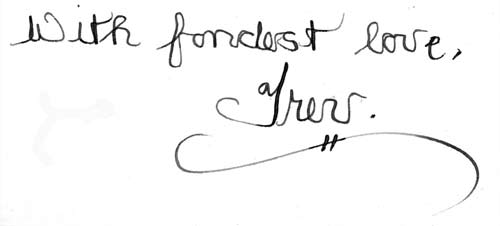"WITH FONDEST LOVE, TREV."
The Letters Home of Lt. E. Trevor Evans,
1917-1919
TREVOR
EVANS, R.F.C.,
AT
NANNAU, DOLGELLAU
March/April 1918
|
|
INTRODUCTION
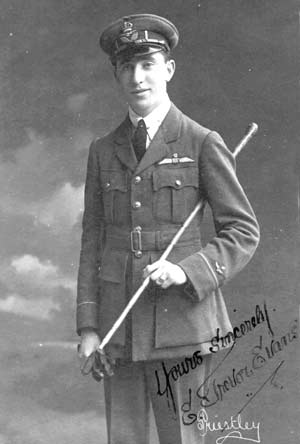 Lt. E. Trevor Evans
was a young man from New Brighton on the
Wirral in Cheshire who was taught to fly in the
Royal Flying Corps in 1917. He served as a
nineteen-year-old pilot in combat, first on the Western Front and
then in Italy before spending several months in England and later returning to action in France for the last few months of the war. After the Armistice he and
his Squadron formed part of the Army of Occupation in
Cologne. Lt. E. Trevor Evans
was a young man from New Brighton on the
Wirral in Cheshire who was taught to fly in the
Royal Flying Corps in 1917. He served as a
nineteen-year-old pilot in combat, first on the Western Front and
then in Italy before spending several months in England and later returning to action in France for the last few months of the war. After the Armistice he and
his Squadron formed part of the Army of Occupation in
Cologne.
Trevor, like many of his generation, was a prolific letter writer
and many of his letters home survive, having been preserved,
lovingly tied up in a length of faded pink ribbon, by his twin
sister. For the benefit of later generations of the
family this pile of letters, photographs and other documentation was
transcribed and assembled into a privately published document
entitled "With Fondest Love., Trev.", the writer's
frequent
closing line. It provides a glimpse of social life on the
Wirral
where Trevor lived and of the impact of war on individuals, families
and society as a whole; and it illustrates many aspects of life as
an R.F.C. cadet, as a rookie pilot seeing action for the first time
and finally as an R.A.F. veteran of many missions and experiences,
all gained before the age of twenty-one.
An almost full version of
"With Fondest Love, Trev.", including all of Trevor's words and
fully illustrated (but excluding most of the extensive appendices of
the original version) can be read elsewhere in this website, here:
With Fondest Love, Trev.
|
|
TREVOR: HOME,
FAMILY AND MILITARY CAREER
Trevor grew up in a middle-class
family in New Brighton on the Wirral; his father worked for a
Liverpool shipping line and there were three children: Trevor,
his twin sister Marjorie (a.k.a. Mickie or Mick) and an elder
sister, Norah (a.k.a. Fattie
and standing at the rear of this family group on 23rd May 1908 -
the twins' tenth birthday).
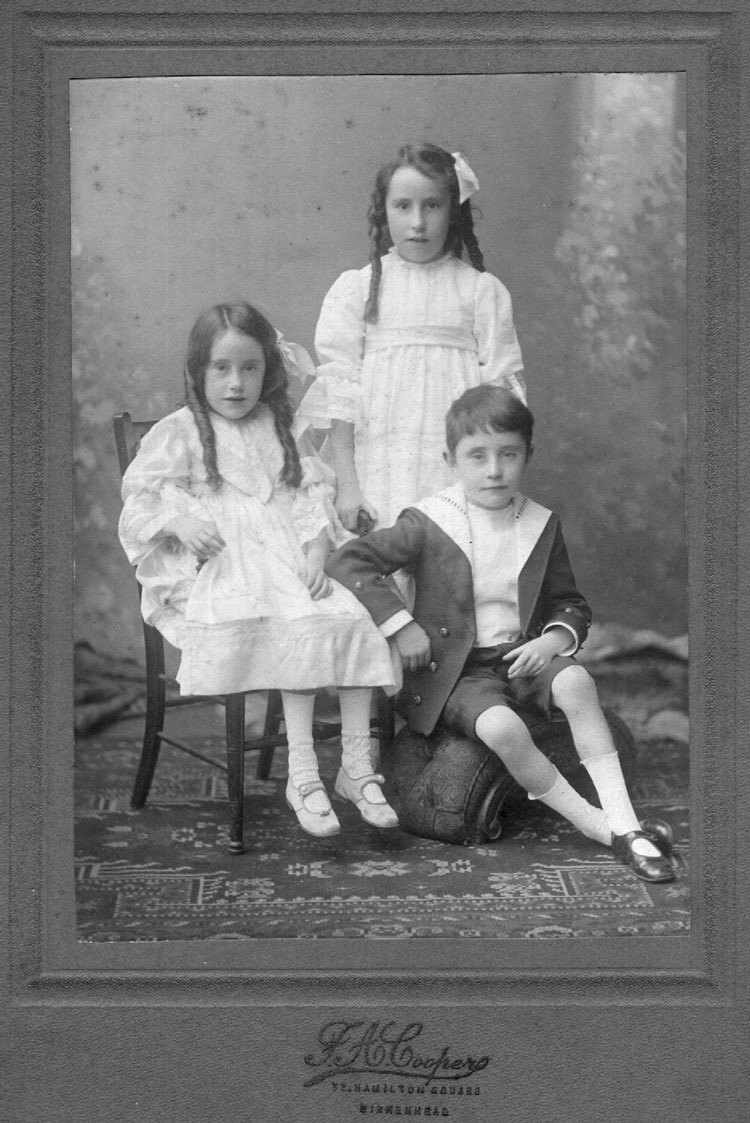
After leaving Wallasey Grammar School
at the age of fifteen, Trevor followed the example of
his father by joining a similar shipping Company with offices in the
Royal Liver Building across
the Mersey. In 1917, at the age of
eighteen, he achieved his
ambition of being accepted for pilot training.
After training at various
establishments in England and Scotland and gaining his wings,
Trevor was posted to France to join
34 Squadron, R.F.C., later
transferring with them to the Veneto
area in Northern Italy in reinforcement of the
Italian defence effort following serious reverses at the hands
of the Germans and Austrians. There he flew long patrolling and
reconnaissance missions, sometimes acting as an artillery
spotter in support of the Royal Artillery gunners operating
thousands of feet below. It was gruelling and dangerous
work. In order possibly to spare his family, Trevor only rarely
gave information about what he was doing and the dangers
involved. One letter was an exception to this normal rule.
|
|
B. E. F. Italy
Tuesday 10th December 1917
My dear Mick,
I have just had my
tea and I'm going to to write you a few lines but have
not much news.
This afternoon I was patrolling
the lines for two hours and now after a nice tea I'm
feeling like a rest but will wait for dinner at 7.30 and
then a nice sleep. By gum, Mick, the Hun anti-aircraft
here is "hot". The best part of my time during the "line
patrol" was spent dodging his shells. He sends simply
tons of dirt (as we call it) about us. I can tell you
it is enough to "put the wind up the troops" when you
see four shells bursting around you. You see, their
object is to make a circle round your machine with
bursts of shrapnel etc so that you will fly into one of
the bursts.
Well Mick, Christmas will soon be
here and I trust if we are still in Italy I will be
receiving your letters. We have not had a mail from
Blighty for nearly a week and I'm fed up with no letters
etc.......
|
|
Another hint at Trevor's state of mind
comes in a letter to Mickie a couple of days later:
| I might tell you Mickie,
quietly, that although I have not been out quite three
months I have seen and experienced all the warfare I
want to. |
|
Something went
wrong for Trevor during his time in Italy and led to his
premature return to England. Within the family there was
always the legend that he had had a serious crash there which
had involved the death of his observer, who was dear to him. But
his letters and the official record tell us little; and nothing
has so far emerged adequately to explain the change in his
circumstances which is revealed by the following letter from Italy. This is about as close as we can get to some sort of
explanation:
|
34th Squadron
B. E. F. , Italy
Saturday 29th December 1917
My dear Dad,
Have just had some delightful news that means I will
be returning to Blighty next month possibly shortly
after you receive this letter.
My flight
commander told me that I am more fitted for a Scout
pilot (i.e. a fighter
pilot) and that they
have decided for me to go home to fly Scouts with the
possibility of first instructing new pilots. If all goes
well I will be home in about a fortnight before starting
my new work and almost certain to get a little leave.
As a matter of fact I'm not keen on flying Scouts
but I am lying low on that point at present and when
once I get home I will see if I can't "wangle" an
instructor's job.
The weather has been very dud
the last two days and I have not been up. We have had a
fall of snow (six inches deep) and it looks as if we
will have more before long. It is very cold flying.....
|
|
He continues writing
from Italy, up to 11th January 1918, and is still
flying. A telegram dated 30th January 1918 announces to
family his safe arrival at the R.F.C airfield at
Lake Down, near
Salisbury, which is followed by several days of
home leave. The records reveal
that on February 20th he has been declared unfit for any service
for the next two months.
| (Meanwhile, in Italy, 34
Squadron continues with its arduous duties and, on the
Western Front, the Germans have gained air
superiority over the Somme. Their strength
there
stands at some 730 aircraft in March with 579 R.F.C. machines in
opposition). |
|
| After several letters from
Lake Down in the first three weeks of February, Trevor writes home on
Sunday 3rd March 1918 from a new address. His stay at
Nannau has begun. |
Trevor announces
his arrival in Wales.
|
Nannau,
Dolgelley,
North Wales
Sunday 3rd March 1918.
My dear Mother,
You
will have been waiting some time to hear from me but I
was too late to catch the post here on Saturday when I
arrived and there was no post today.
I
travelled down as far as
Llangollen with a New
Brighton gent, one Mr
Lodge by name of Grove
Road and I arrived at
Llangollen prompt at 5.10 to meet one perfectly
good RAMC captain at the station. There were four other
officers besides myself and we were conveyed by motor
car to the hospital which is situated three miles from
the small village of
Dolgelley, right up in the hills. The hospital is
a beautiful large house not unlike the
Cenacle but larger and
beautifully furnished and has only been used as a
hospital about three weeks. As far as I can see it is
absolutely money for jam. We have breakfast at 9.0,
lunch at 1.0, tea at 5.0 and dinner at 7.45. We have the
whole day to ourselves but have to be in to all meals.
I am
in a ward with three other officers - the two captains
and a “second loot” – there are also two vacant beds in
the ward. I went to bed at 9.30 last night as I was
rather tired and at 10.15 the sister brought me a glass
of hot milk with something in - one of the officers said
he thought it was Sanatogen but whatever it was it was
very nice. At 8.0 this morning I was awakened with a cup
of tea brought by a very nice nurse, after which I got
up, washed and was down for breakfast at 9.0. At 11.0
a.m. I had a nice hot cup of chocolate.
Now
for things in general. The hospital is owned by
Mrs Vaughan the wife
of a Brigadier General. She is a very nice lady and is
about the hospital. The sisters and nurses are very nice
but are all ancient - you understand me better perhaps
if I say "stricken with years". The hospital is
beautifully situated up in the hills and stands in its
own grounds. It has accommodation for 50 officers but at
present
there are only 36 of us. For
recreation there are plenty of nice walks and about two
miles away there is a stream and a small lake where
there is trout fishing. There is also shooting and I
think that I will get more shots at rabbits before long.
It is
very quiet here and I am sure the rest will do me good.
Unfortunately it is very cold here – there has been a
downfall of snow but it is mostly cleared away now.
When
you send my clean shirt would you please send me my
house slippers for they all use them here. You will find
them in my valise, they are in the top or the bottom of
it.
Well
mother dear will close now hoping to hear from you soon.
Am already feeling better for my convalescence.
With
fond love to all.
Trev.
PS We have a billiard table
here so I am alright. |
|
|
|
|
Nannau Hall is
listed as a neurological hospital for officers. Such
hospitals are intended for cases needing special but not
prolonged treatment. It
is an elegant 18th century house which at the time of
Trevor’s stay is part of a large estate and has been for
many centuries. It can trace its
origins back to the 12th century and is thought to be the fifth
house to be built there. Its owner is the
Vaughan family whose links to the estate stretch
back to its establishment in the 12th Century. Here is one
approach to it; beyond is the start of the long
driveway down to Coed y Moch lodge and the road to
Dolgellau.
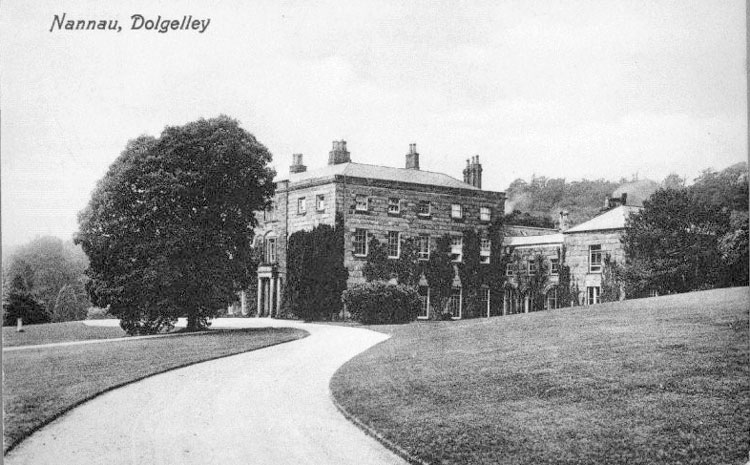
(with
acknowledgement to the original postcard publisher)
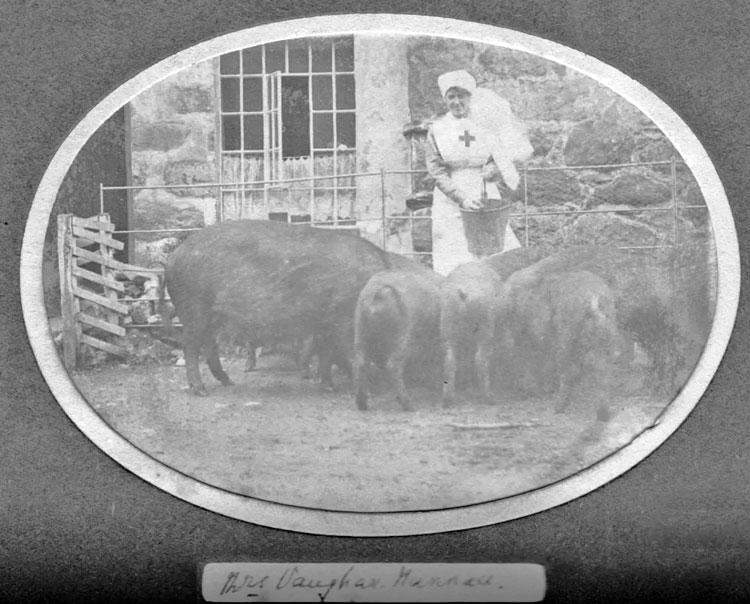 With
grateful acknowledgement to the
nannau-wales
website and to Paul Bradly. Image ©
Paul Bradly 2023 With
grateful acknowledgement to the
nannau-wales
website and to Paul Bradly. Image ©
Paul Bradly 2023 |
The hospital has been created by
Mrs. Louisa Vaughan,
the wife of Major-General
John Vaughan who
inherited the estate only the previous year. Its life will be temporary
but the need for it will remain until 1921, long after
The Armistice, and then it will revert to a peaceful family home.
Here is Mrs. Vaughan
(right)
in nursing uniform, busying herself with domestic tasks.
Trevor's comment about the antiquity of the nursing
staff is hardly gallant - but then, as a mere
nineteen-year-old, perhaps everyone appears old in his
eyes! In any case, he has been writing just four days
before the arrival of at least one younger member of
staff who is only a year older than he:
Maria Nest Davies
(b. 1897, below left )
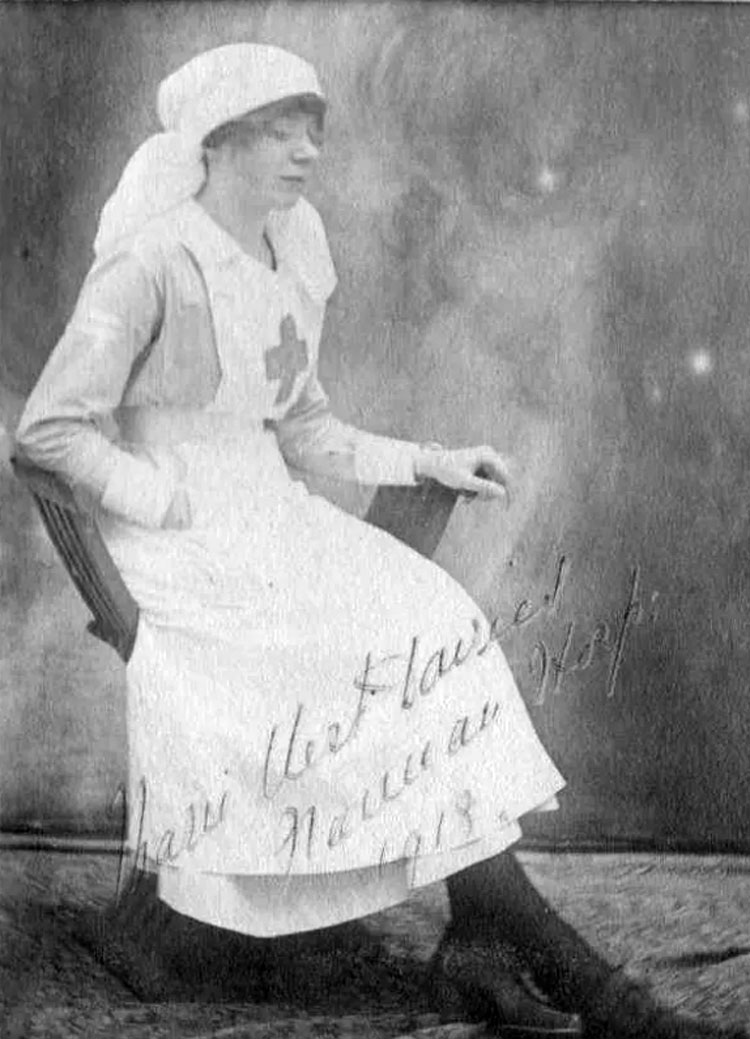
With grateful acknowledgement to the
nannau-wales
website and to Paul Bradly. Image ©
Paul Bradly 2023 |
who started her duties on the 7th March, a few days
after Trevor's arrival, and will stay at
Nannau for about a year. She and Trevor will surely know
each other.
Maria will in due course marry
Joseph Dunstan Bradly
(1898-1964) who himself is a patient at Nannau in 1920. Joseph
Dunstan Bradly is another R.F.C./R.A.F pilot who, after
several crashes during his wartime flying, will suffer
from the effects of a brain injury for the rest of his
life.
There may well be other younger members of
staff: when Trevor
arrives the hospital has only been running for a very
short time and levels of both patients and staff are
presumably still increasing.
Images of many more of these
devoted women who cared for their patients at Nannau
between 1918 and 1920 will happily survive
and they can be seen online over a century later.
(See the link at foot of
this page to the Nannau website).
Amongst them is Sister
Nellie Edwards.
|
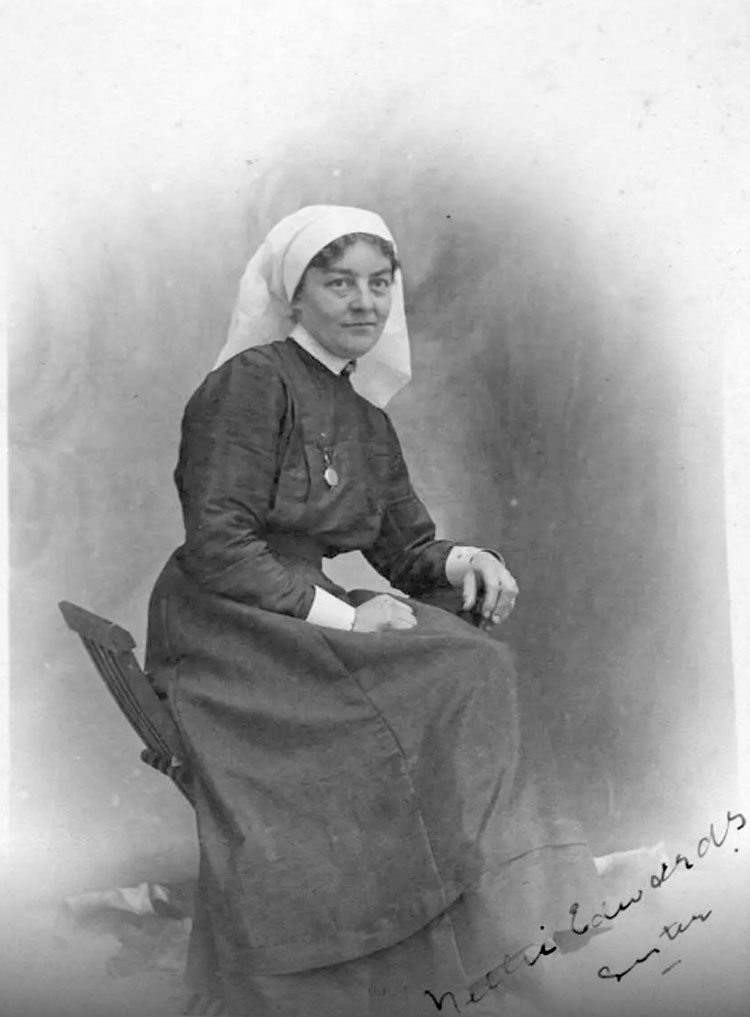 This
and the following four images appear here with
grateful acknowledgement to the
nannau-wales
website and to Paul Bradly. Images ©
Paul Bradly 2023 This
and the following four images appear here with
grateful acknowledgement to the
nannau-wales
website and to Paul Bradly. Images ©
Paul Bradly 2023 |
|
And Bettina M. Curtis and "Nellie": |
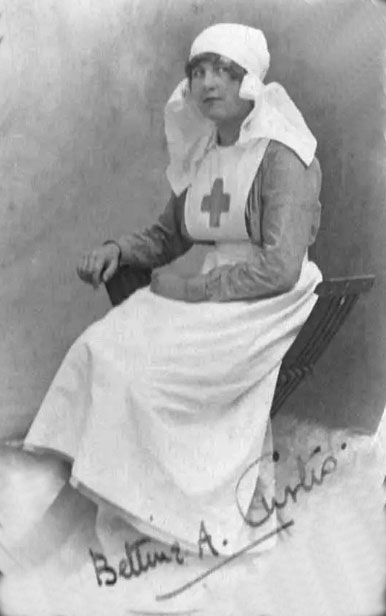 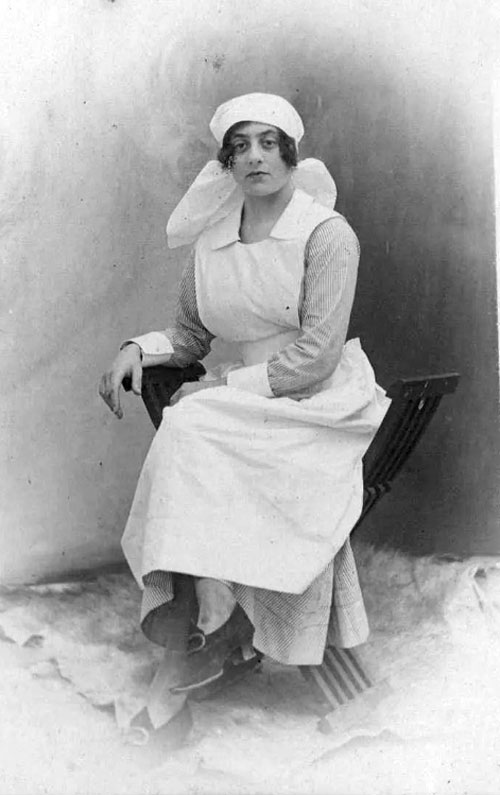 |
|
Capt. A. B. Howitt
is the hospital Medical Officer and he may
well be the "perfectly good RAMC Captain"
who collected Trevor's group from Llangollen
Station. on Saturday, March 2nd. Below,
Capt. Howitt poses for a studio portrait and
is seen chatting to a patient whilst, behind
them, a nurse looks at them as she adjusts a
window of one of the wards.
| (Meanwhile.........ON THIS DAY,
SUNDAY, MARCH 3rd 1918 when Trevor is writing
home, the day after his arrival at Nannau, the Bolsheviks
finally sign a peace treaty with Germany and Russia is out of
the war. This releases 70 divisions for use on the Western Front
before the U.S. Army appears there in force). |
|
|
Nannau,/strong>
Dolgelley |
Postcard dated 6th
March 1918
Dear
Dad,
Just a
line to let you know I am already feeling the benefit of
my rest. It was much warmer today here. I went a short
walk this afternoon and the scenery was beautiful. I am
very happy here and have plenty of billiards. Have not
had a line from home yet! Have you purchased my War
Bonds yet?
Trusting all are well, Trev.
|
|
|
Nannau,
Dolgelley
7th March 1918
My dear Mother,
I was very pleased to
receive your nice long letter this morning together with
Auntie Lizzie's and am now awaiting the parcel
containing my clean shirt.
Now I will
answer some of your questions. Yes, I have seen the
owner, Mrs Vaughan.
She has all her meals with us and is very chatty. The
dining room is a fair size room with seven tables in
(small ones) and we sit round about six at a table for
each meal. The meals of very nice but we do not get
large helpfuls - possibly I am increasing my appetite.
My fellow invalids are on the whole quite a nice lot -
some of them really do look ill but I can safely say I
look a "picture of health" to the majority - at least I
have been told so.
The weather
here has been warm and topping for strolls in the
evening but during the daytime has been very windy.
I went down to
the town of Dolgelley
with several others the other afternoon (three miles all
downhill) and we went to the
Royal Ship Hotel - the only place to go to for
tea. There was no rationing for us and we had tea,
bread-and-butter (plenty) and jam also some fresh caught
salmon and then an egg for 2/6 (12.5p) - absolutely
money for jam.
Then we had a
car (hired) back to our ho- (I nearly said Hydro – Ha!
Ha!). I am going down to Dolgelley again this afternoon.
Do you mean
that I had better “sport” a new pair of house slippers?
Will close now
hoping to hear dad is much better in health.
With fondest
love to all.
Trev.
|
|
Nannau,
Dolgelley
8th March, 1918 |
My dear Norah,
Was very pleased to
receive your letter this morning. When is mother sending
my clean shirt? Possibly she has sent it but I have not
yet received it.
Now with regard it to
the Barmouth “touch”.
I think if we are going to have nice weather and it does
look promising it will be fine for you all to come to
Barmouth but I have put in for a transfer to a hospital
at Maghull, 25 minutes
run in the train from
Liverpool and I think there is a good chance of
my getting it. In that case it will be better for you to
stay at home as I will get home for Easter in the day
time and we could all have a good time together. Write
me by return and let me know what you think! I will know
early next week if I am to be transferred.
Thanks for the
message from Violet. I have already written to her
saying I was sorry not to have seen her before I
returned.
I am hoping Father is
now much better.
No, the house I went
to and frightened the maids was near
Catterick, not at
Grantham where Jimmy is.
I will be thinking of
you in the Adelphi
tomorrow afternoon. "O-O-Over there, Oh! Oh! Oh! Over
there".
Goodbye now dearie.
With fond love to all,
Trev.
|
|
|
American cultural influences are
making themselves felt:
Over there, over there,
Send the
word, send the word
Over there
That the Yanks are coming,
The Yanks
are coming,
The drums
rum-tumming
Ev'rywhere.
So prepare,
say a pray'r,
Send the
word, send the word
To beware.
We'll be
over, we're coming over,
And we won't
come back till it's over
Over there. |
|
Nannau,
Dolgelley
Monday 11th March, 1918 |
| |
My dear
Mother,
Many thanks for your letter and parcel
received. As you say my slippers will last me quite a
long time yet. I am glad to hear that dad is now feeling
better.
Yesterday afternoon (Sunday) and the week
before I have acted as sidesman at a little country
church about a mile from here and yesterday the parson
asked me to his home for tea. It was very nice.
Yesterday morning I went with another “sub” to the lake
about one-and-a-half miles from here and we got a small
punt out of the boathouse and had a fine row all morning
and returned to lunch feeling A1.
I am still
waiting to hear if my transfer to
Maghull has come
through. I am very much hoping it will.
The
weather has changed here and it looks as if we are going
to have a lot of rain.
Will finish now but will
write more next time.
Fondest love to all,
Trev. |
|
|
No image survives of Trevor's trip to Lyn Cynwch that
Sunday but another photograph does, of two other
patients enjoying the experience on a similar winter or
spring day - Lts. Scott and Roach.
With
grateful acknowledgement to the
nannau-wales
website and to Paul Bradly. Image ©
Paul Bradly 2023
|
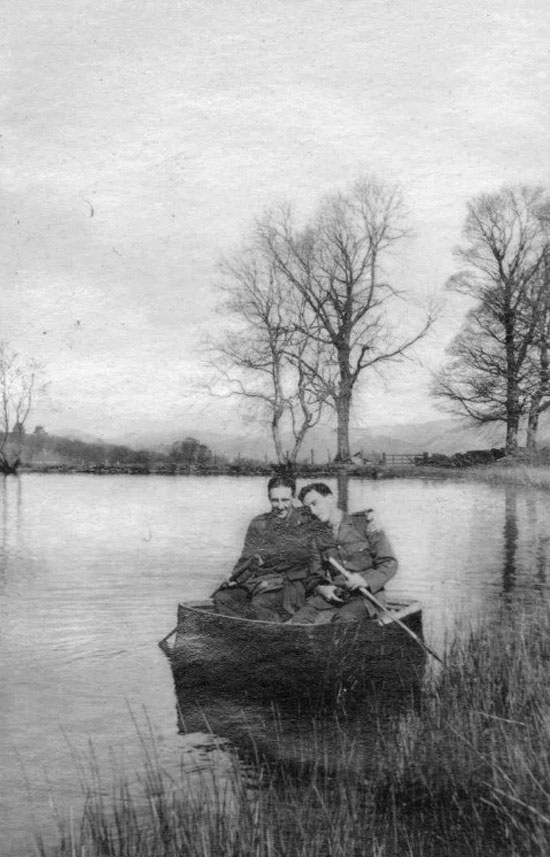 |
|
Postcard dated 13th March 1918
My dear Mick,
Many thanks for your letter. I am
feeling fine but have no news of my transfer.
Please excuse this postcard as it is a glorious
afternoon like summer and I am going a long walk.
Hoping all are well.
Fond love. Trev. |
|
Nannau,
Dolgelley
Saturday
16th March, 1918 |
My dear Mother,
I was expecting a letter from you
yesterday but it did not come until this morning.
I
am feeling a little better now. Yesterday afternoon I
went rowing on the lake. A friend took a snap of me and
the punt and I think it will turn out all right, judging
from the negative.
(Image lost)
How fine Jack being home for, let
us hope, a long time. I will drop him a line.
There
are several officers here who came from Maghull to start
this hospital and they tell me I would get home very
often from there so would have a nice happy time and yet
would keep regular hours (sleep). However I have not
heard yet and is quite probable I will remain here at
any rate for a time.
Poor “Fatty” will be very sorry
about Eric
(Eric Westrup) not coming home - convey to her my heartfelt
sympathy – bow-wow.
Now mother what do you think
about coming to Barmouth. I have not been there yet but
except for the pretty scenery I am told there is
nothing. It is very quiet and no visitors. Then it is 40
minutes train journey from here and not many trains - a
single line. If you have decided you would like to come
let me know how many rooms to get and I will go and book
them at a nice place at Barmouth. I don’t think you
would care to stop at the Royal Ship Hotel, Dolgelley as
the village is not nice but the country round about I am
sure you would like and then it would be much handier
for me to come down and meet you.
“Nannau” stands right
up in the hills (800 ft above sea level) and the village
is in the valley two and-a-half miles away.
I will be
going to Church tomorrow afternoon. I am going boating
again this afternoon.
What you think of the enclosed
photos of “Nannau” and the entrance?
Hoping dad is
well, I will close.
With fond love,
Trev.
PS Do
not forget to let me know what you have decided about
Easter! |
|
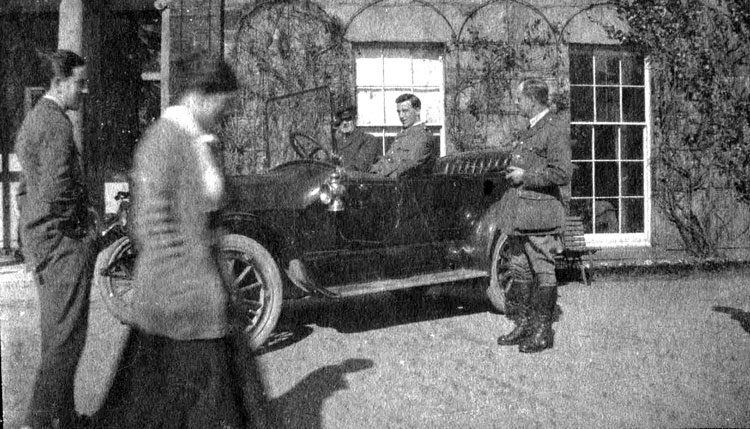
Trevor, extreme
left; possibly Mrs. Vaughan next to him |
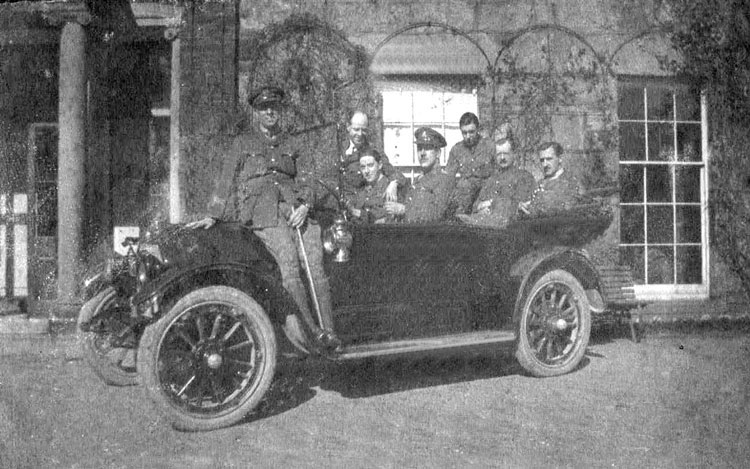
Trevor at the wheel with
an older officer standing on the running board, an
affectionate arm around Trevor's shoulder;
Lt.
Butterworth in the passenger seat next to Trevor |
Nannau,
Dolgelley
Wednesday 20th March, 1918 |
My dear Mother,
Was so pleased to receive your letter
this morning. I do hope you and dad are feeling better
now. No, it is not “nerves” that I am suffering from but
a really bad cold in my throat and body. I will get into
a hot bed and get a dose of quinine from the sister
tonight and try and get rid of it. I was feeling fine
and as I told you before looked the healthiest in the
hospital until I got this wretched cold but I hope to
get rid of it soon.
Has dad decided where he is
going to? If he is near London I will be able to see
him.
I expect to get my orders for London one day
next week and would try to go via Liverpool so as to
call home on my way if only for an hour or two.
When
next you see Mrs McKinlay will you ask her for Norman's
address? I think he has left Hastings. Fancy when I last
saw Norm. he was in civvies and it was 14 months ago.
I am afraid the enclosed snaps have not printed clearly
but I am sending them for you to see.
(Images lost)
It has been
very misty yesterday and today so I would not have gone
out had I felt well. So will close.
With fondest
love,
Trev. |
|
The
Lion Hotel,
Barmouth
Thursday
21st March, 1918 |
My dear Dad,
I hope these few lines will find you
feeling much better. I have just got over a bad cold and
came to Barmouth for the first time this morning, with a
friend. It is a beautiful day. We have just had a very
nice dinner - no rations - and are now going a perfectly
good walk along the front complete with blue bands.
I
hear you are going away this weekend for rest and hope
you will come home feeling much stronger and better.
When I get to London will you try and arrange a weekend
with me as I will have the whole day to myself?
Thank
Norah for her letter which came this morning!
Will
close now as my friend is waiting to go for a walk. Let
me know where you are going for rest.
With fond love,
Trev.
|
|
The blue bands mentioned are blue armbands worn to
denote invalid or convalescent servicemen.
| (Meanwhile.........ON THIS DAY,
March 21st 1918, far away from the peace and
quiet of mid-Wales, the Germans launch their
offensive on the Western Front, an attempt at a
knock-out blow. By nightfall seventeen RFC
squadrons are forced to evacuate airfields in
danger of being overrun by oncoming enemy
forces. The Germans attack at the junction of
the French and British forces in north-eastern
France and hope to advance along a 50 mile front
from Arras to
St. Quentin and
La Fere. The
British Fifth Army collapses in confusion but
the Third withdraws across the
Somme in good
order. By March 27th the Germans have advanced
40 miles and are threatening
Amiens. Exhaustion,
increasing British and French reinforcements and
constant low-level attacks by RFC and RNAS
squadrons finally halt the attack 10 miles to
the east of Amiens at the village of
Villers-Bretonneux. On April 5th the Germans
call a halt, realising that a decisive victory
along the Somme is not going to be achieved. The
losses to the British and French are some
240,000 and the German losses are similar. |
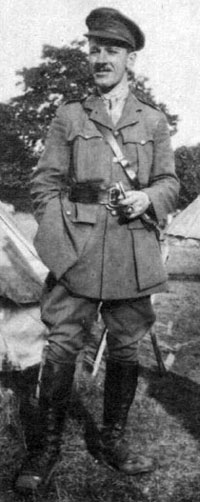
On April 1st 1918 the
Royal Air Force is created, the
world’s first dedicated air force, and Trevor, like
thousands of other men, is no longer a member of the
Royal Flying Corps.
Some time around this date,
Trevor leaves Nannau, saying farewell to new friends and
the staff who have cared for him over the previous
weeks. Amongst those he leaves behind is
Lt. Butterworth
who appears in the above pictures. This officer must
have given Trevor a photograph of himself, taken at an
earlier period of his military service, to remember him
by
(right).
And Trevor did remember him: the photo survives
in Trevor's album with the caption:
"Butterworth - a pal at Nannau".
|
| IN
TREVOR'S FOOTSTEPS AT NANNAU
|
The
century following Trevor's short stay - or perhaps, more
accurately, the final third of that period when it
ceased to be a family home - has not been kind to Nannau
Hall. It has seen the demolition of wings and other
buildings, significant changes within, other vain
attempts to make this huge property suitable for modern
purposes, the total disappearance of manicured gardens
and grounds and, most recently, apparent abandonment.
What remains is a once noble house, still in its
original setting overlooking beautiful countryside and
probably as peaceful as it has ever been - but now
crumbling, eerie and redolent of ghosts. Ghosts of a
family who opened their doors to a succession of damaged
men, and of those who tended them. And ghosts of the
men themselves, some of whom were sufficiently cured, at
least temporarily, to be able to return to battle.
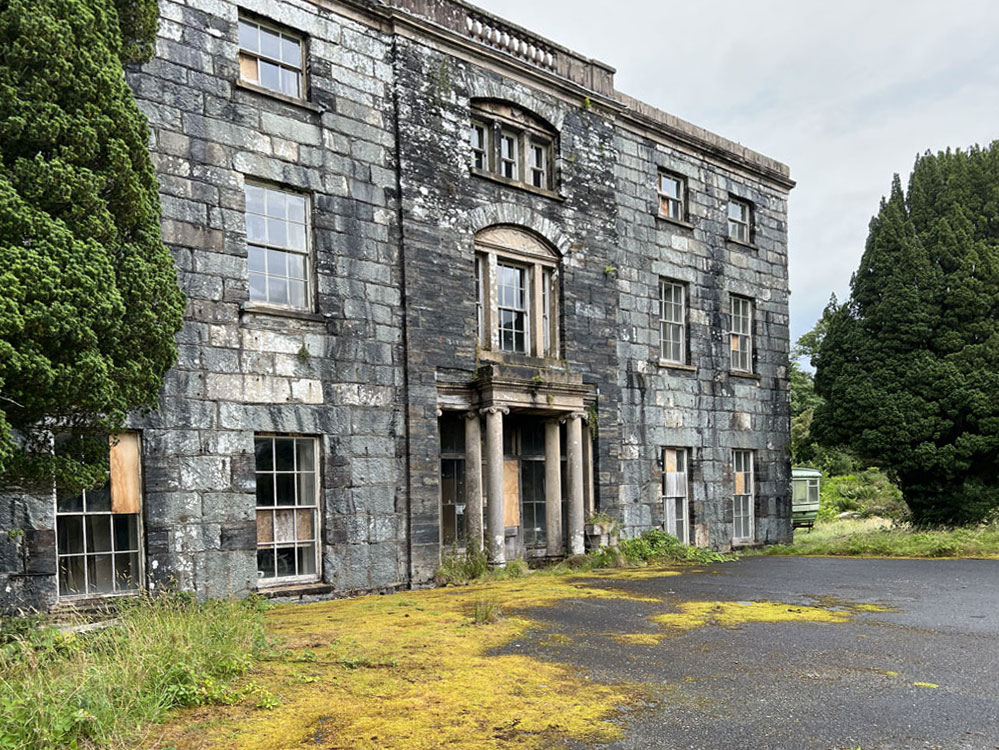
Amongst these men was, of course, Lt. E. Trevor Evans,
R.F.C., a nineteen-year-old veteran from New Brighton on
the Wirral.
More than a century later, in July 2023,
let us stand in front of the house and
take a
walk in Trevor's footsteps.............
|
| On 7th
March 1918, Trevor tells us that he's going down into
Dolgellau that afternoon. It's a Thursday. In the days
since his arrival on the previous Saturday he has
already undertaken this walk once before, for tea at the
Royal Ship Hotel. At least physically he seems to be fit. |
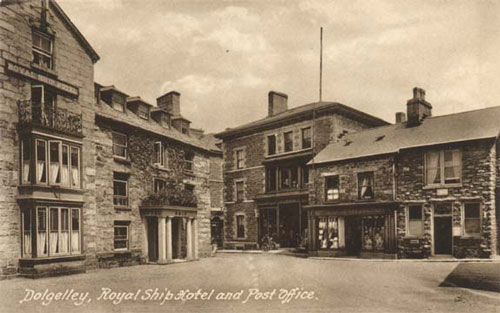 |
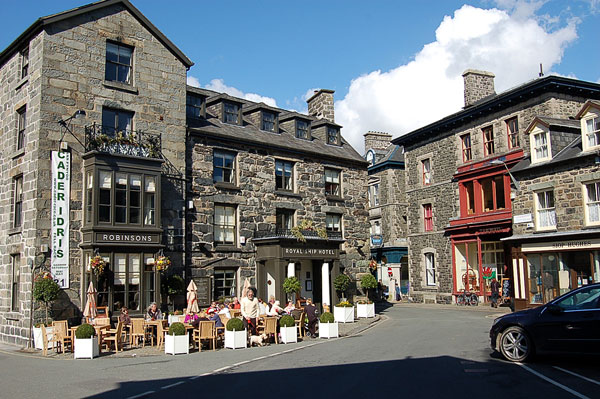 |
| Trevor and
his pals will almost certainly take the most direct
route, the private drive which snakes downwards from the front of the house
to the south. If they emerge from
the front door, they will look out over well-kept lawns,
almost ready for their first cut of spring, and, beyond,
pasture, woodland and distant hills. |
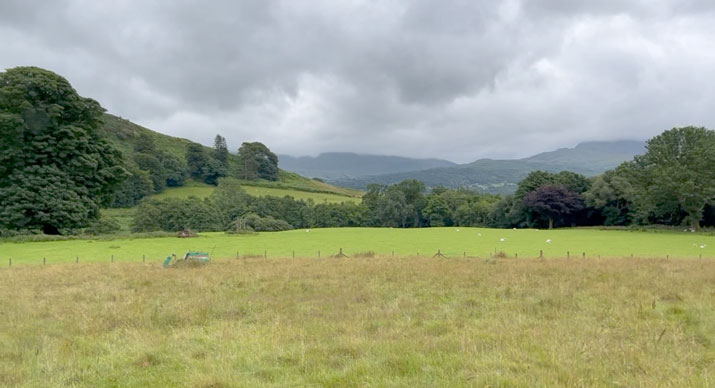 |
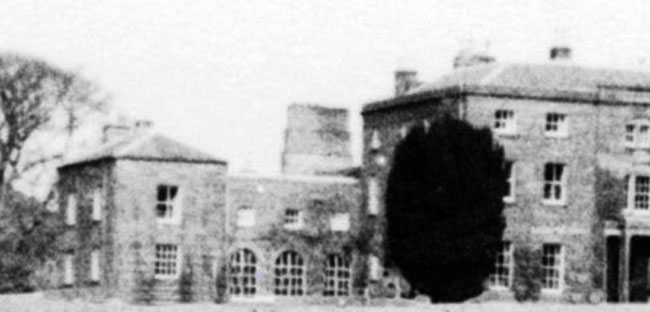 As they
come out through the front door, they will turn right, crunching over the drive
of gravel or crushed stone, past the front of the house
and then the south wing pavilion which is set back to their right
beyond a strip of further lawn. As they
come out through the front door, they will turn right, crunching over the drive
of gravel or crushed stone, past the front of the house
and then the south wing pavilion which is set back to their right
beyond a strip of further lawn.
The drive stretches away
in front of them from the corner of the house and disappears down
to the left into woodland. As Trevor
looks at the landscape through which he is about to
walk, it will still look wintry, the
trees bare apart from the mighty evergreens flanking the
house and only the grass showing the first signs of
approaching spring. At this elevation it will be slower
to arrive than further down, in the valley. |
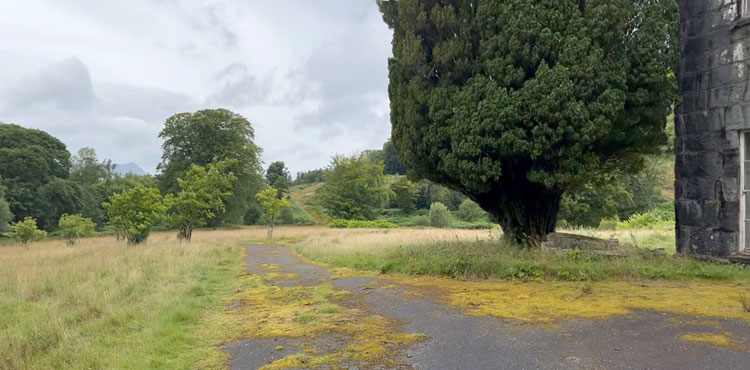 |
|
And as he sets off he can
glance back at the house and this is the view of it he
will also get on his return as he and his friends plod
back up the hill - or ride in comfort in a motor car
hired from the village. The driveway is probably
tree-lined as he sees it; it is certainly broad enough
for carriage and horses or the new-fangled motor car and
it is bordered by well-kept grass on each side: it is an approach
appropriate to a noble house. |
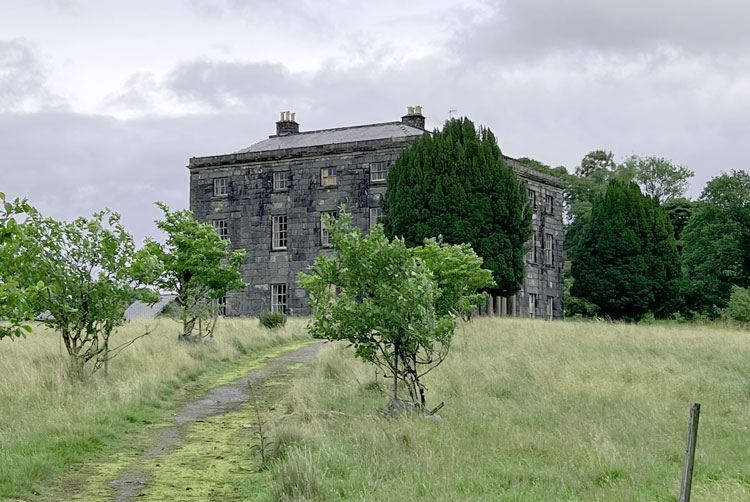 |
| Onward,
down the hill, into woodland, the trees still bare. It's a
long way before our small group will leave the immediate
grounds of the estate, the best part of a mile. The hustle and bustle of the busy
house is soon left far behind as they walk on; little is
to be heard apart from the rustling of bare branches as
the breeze moves them and the sound their own voices as they discuss the
prospect of tea at the Royal Ship and perhaps the
arrival of new patients and nursing staff back at the
house. |
| Eventually
the south lodge of Coed y Moch appears out of the trees. They
pass under the arch towards the road........ |
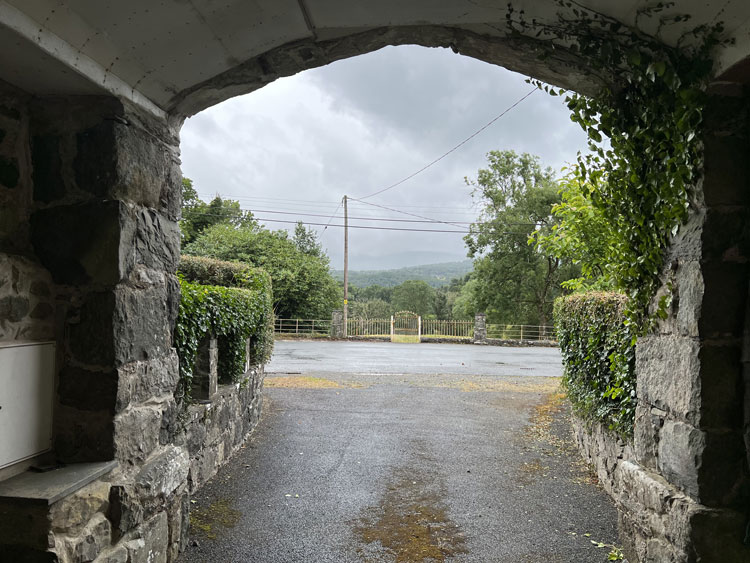 |
| .....and look
back whence they have come..... |
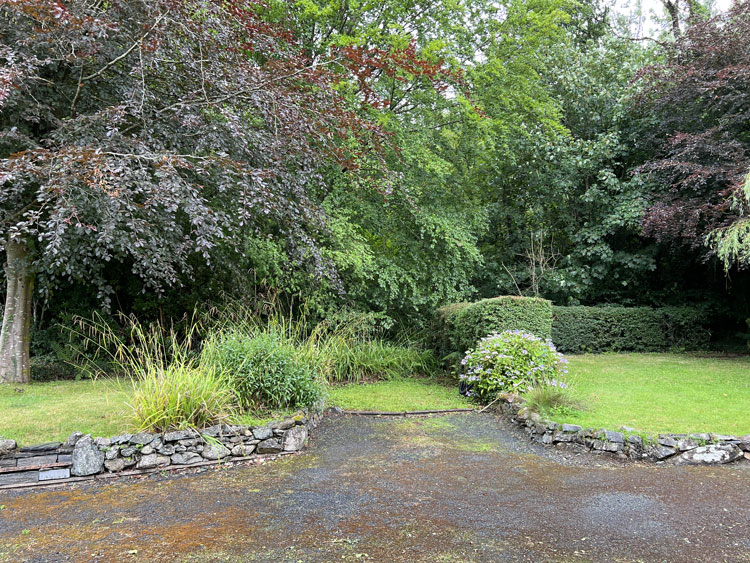 |
| ..... and,
crossing over the rough road, look out over yet more Vaughan
family land, beyond an iron gate bearing the "V" initial. |
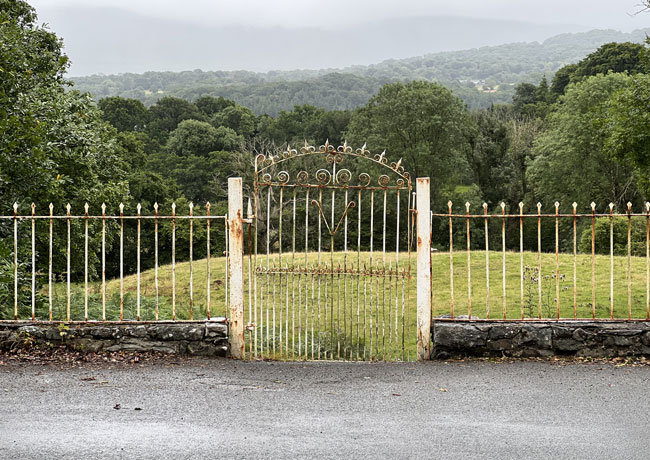 |
|
Coed y
Moch Lodge now stands behind them. They give it a
quick glance..... |
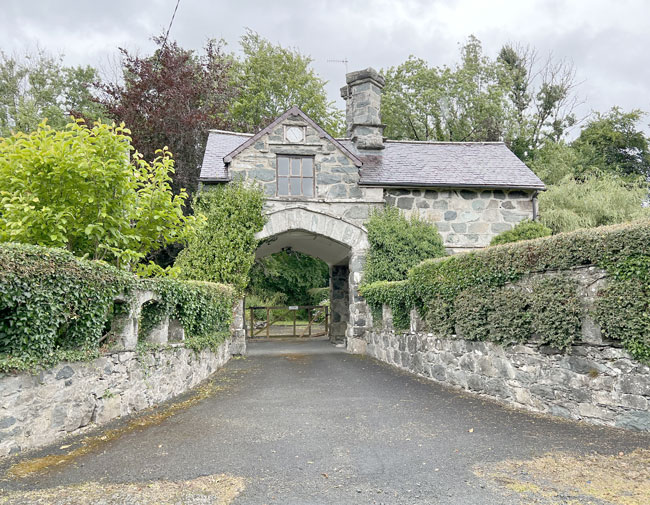 |
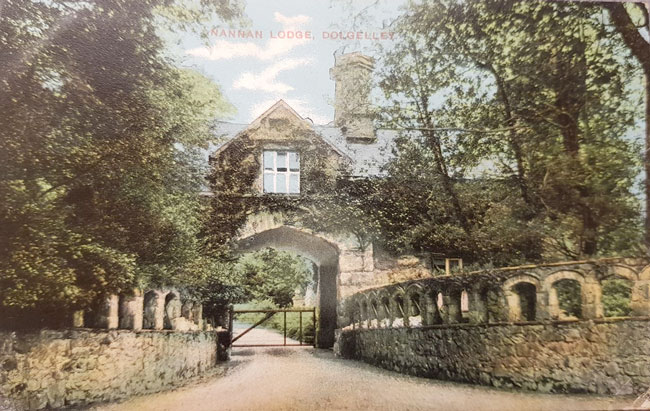 |
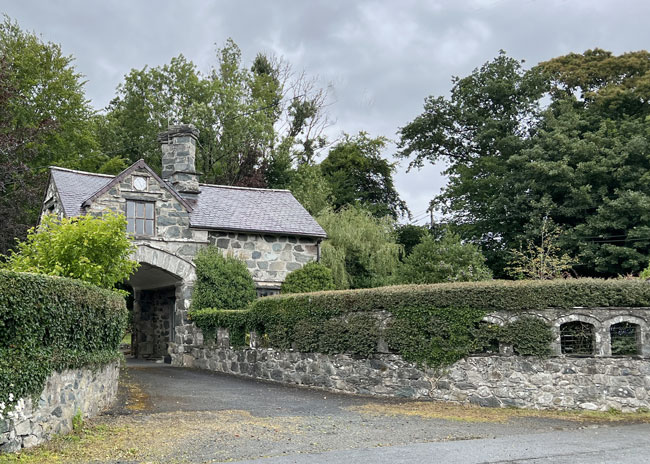 |
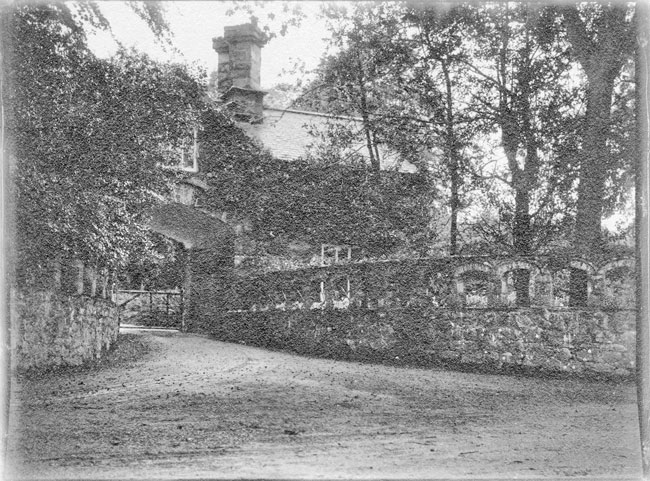 |
..... and then stroll off down the hill
to their right towards Dolgellau, to the
Royal Ship
Hotel and to an afternoon tea fit for a King - or for
guests of the Vaughans.
Later, they'll return,
perhaps on foot or, much more likely, by car again, for
it's quite a long haul up from the town on foot, even
for young men. If they have indeed invested again in a hired car they will probably re-enter the grounds through
the archway; but their driver may decide to carry on up
the road, up "the hill at Nannau"........ |
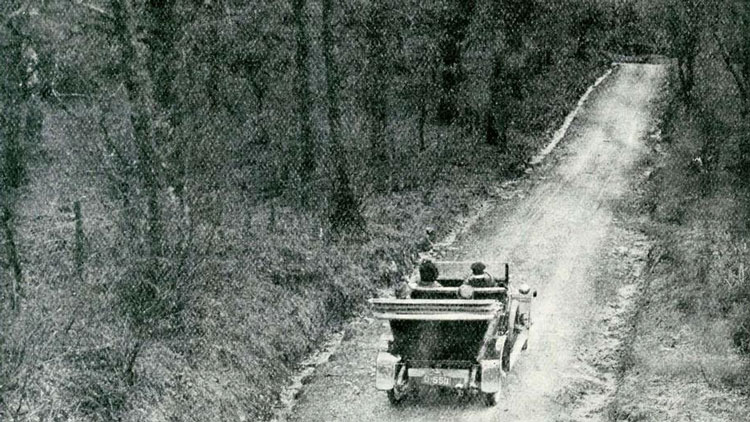 (with
acknowledgement to "The Field" magazine 1915 and the
Nannau Facebook page) (with
acknowledgement to "The Field" magazine 1915 and the
Nannau Facebook page) |
....... and approach the house by a different route.
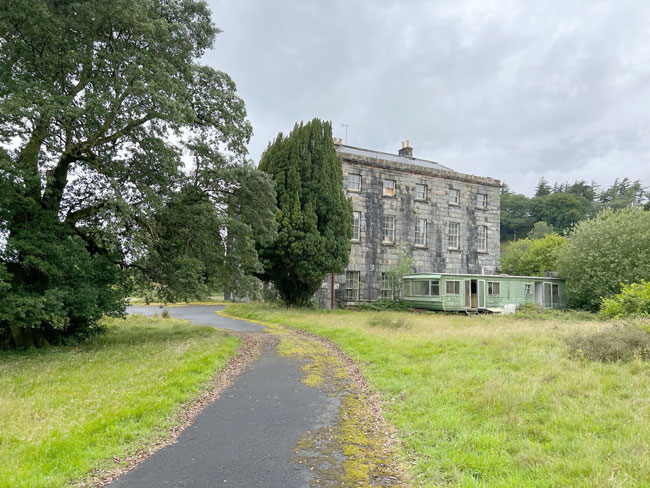
|
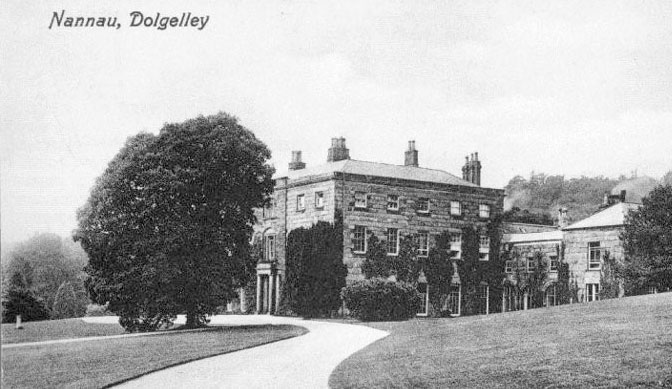
|
The modern world has long
since penetrated the precints of
Plas Nannau. Not only
has the internal combustion engine arrived but perhaps
electricity with it - although Trevor makes no mention of
that new convenience. As we leave him and his companions
to re-enter the house with its warmth and care and
companionship, after their long walk and an unrationed
high tea down in the town, we'll take a final glimpse of
the house and some of its occupants: a moment when the
evidence of this now rapidly changing world - and a hint
of the house's future - are apparent.
The
next views are of a moment perhaps a week or two later. A group
of young - or youngish - men are fooling around -
outside the front door. We have seen them once already.
Trevor is on the extreme left, watching the goings-on.
It is probably Mrs. Vaughan in the foreground, moving
from left to right. One of the group is taking the
picture. But in the background, the house we see
is of course the 21st century house, not the well-cared
one of March 1918 in front of which Trevor stands, hands
in pockets as he looks out over immaculate lawns.
Perhaps Nannau has always had its ghosts.
|
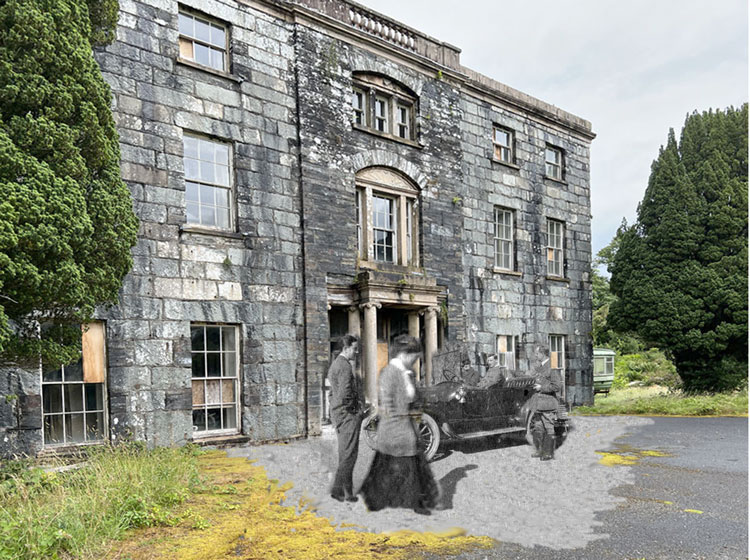 |
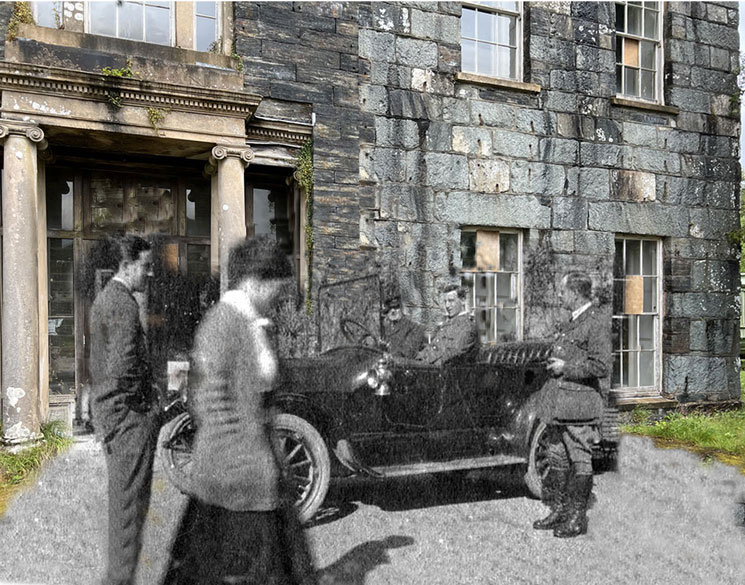 |
All the group pile into the
car. Trevor is at the wheel. There is the
affectionate arm of an older officer round his shoulder.
It's probably that of Captain
Howitt, and, again, it it
is likely to have been he who was "the perfectly good RAMC
captain" collecting Trevor and his three companions from
Llangollen railway station three weeks earlier. It may
well have been in this car - perhaps it is the Hospital
vehicle. Lt. Butterworth is in the passenger seat;
the other four officers are unidentified.
You
can almost hear the banter:
"SURE you can
drive, Evans?"
"'Course he
can't! He's only good for one of those infernal flying
machines".
"Oh, DO shut up,
Butterworth!"
And a female voice:
"Now keep still,
gentlemen, and look at the camera......" |
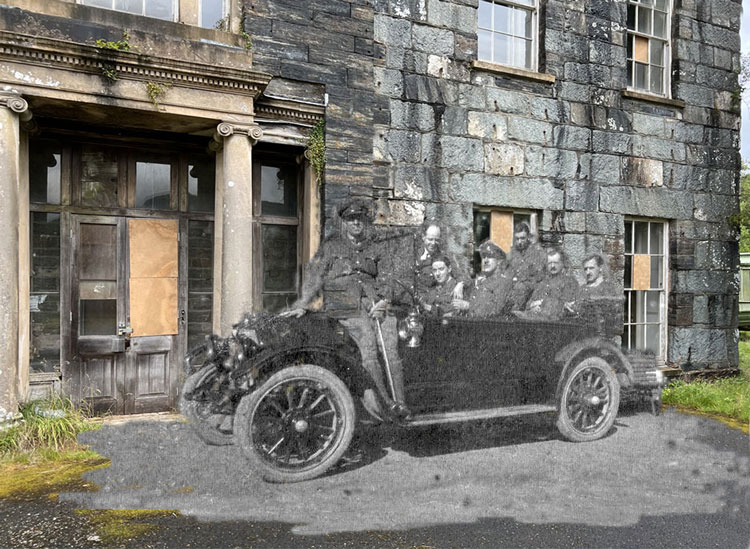
It will not be long before
Trevor leaves Nannau after his short spell there. His
letters home will tell us that he has been happy in
those few weeks and, presumably, relaxed - which seems
to have been the aim of much of the treatment.
In
the future, will he look back and think much about
Nannau? Possibly, when he undergoes other spells in
hospital later. But as he departs, will he give the slightest thought to what
the future might hold in store for the house, for the
family which owns it and for those who work there,
either permanently as employees or temporarily as
hospital staff? Almost certainly not. And, after
all, what nineteen-year-old would ever do that,
especially in these extraordinary times when there is
still the War to be won and he knows that it remains his
duty to go back and help, just as soon as he is fit enough.
|
EPILOGUE
Following his letter from
Barmouth, Trevor's
movements are unclear. Perhaps a letter or two, or even
a telegram, have been lost. But we can be certain that
in the last few days of March or at the latest by the
first week of April 1918, Trevor has achieved his ambition of
a transfer from Nannau to another hospital,
Quarry Brook at
Maghull near
Liverpool,
close to his family home. He has left Nannau
behind and, with it, a number of fellow officers
including Lt. Butterworth.
On 20th April 1918 he
is declared unfit for duty for 8 weeks to be followed by
a further four of Light Duties. He has been with his
family before he sends this, his only surviving letter
from Maghull.
Quarry
Brooke,
Maghull
Thursday |
My dear Mother,
I hope you have quite
got rid of your cough now. You will be glad to know I will be
home for the weekend, it is a pity the weather has changed more
especially as it will not help our army in France in pushing the
Bosche back. I see the Huns are only 14 miles from
Amiens. I had
several good “feeds” there last year but then the Huns were a
long way off.
I have just written a letter to dad. By the
post this morning I received a letter from Jack and Harry
forwarded on from “Nannau”. I am glad I am not there with
weather like this.
This afternoon I hope to meet Norah and
Mick in town and tomorrow I think I will stay here and will come
over to New Brighton on Saturday afternoon. Will my washing be
ready for me then?
It is very nice here but my bed is not
near so comfortable as my last.
Goodbye-e for the time mother
dear and a happy Easter.
Fondest love,
Trev. |
All further
communications between Trevor and his family will,
happily, be face-to-face during his stay at
Maghull; and
we can know nothing of them. On May 23rd
1918 Trevor
celebrates his twentieth birthday.
(Meanwhile......
On APRIL 9th 1918 the Germans open their
second attack on the Western Front, this time against the
British First and Second Armies and in the direction of the
Channel ports. They advance from
Neuve Chappelle on a 12 mile
front and progress five miles whilst in a parallel attack a 30
mile breach is made in the British line near
Messines. The
British resistance is desperate. The German drive is halted near
the Lys river and by the end of April their attempt to reach the
ports will be seen to have failed. Each side will have lost some
100,000 men, killed or injured.
APRIL 21st: Baron
Manfred von Richthofen, the
leading German air ace, is shot down and killed. He is buried
with full military honours by the British. His command is taken
over by another German ace, Hermann Goering.
MAY
19/20th: Germany mounts its largest (and last) aircraft raid on Britain,
killing 49 and injuring 177 people).
|
Trevor's story
after his two month stay at
Maghull takes us back to the aerodrome at Lake Down, near
Salisbury, and his
continuing recuperation and return to the cockpit. From
August 1918 he serves with 206 Squadron on the Western
Front, flying, like all his comrades, at an intensity
which the RAF will not repeat until the Battle of France
and then the Battle of Britain in 1940, just twenty-two
years later. In December 1918, after The Armistice he
and his squadron become part of the Army of Occupation
in Cologne and
Bickendorf.
Demobilisation comes in April/May 1919 and he returns to
civilian life.
Trevor's later life in the post-war world will be sad
indeed, for himself and close family, and perhaps beyond
our imagining. After surviving the war and all its risks
- unlike so many others - he will work in Liverpool for
several years but late in the 1920s will suffer a
breakdown of his mental health. Thereafter he will be
cared for in a nursing home far from his home and family, up to his
death in 1941 at the age of 43. A tragic end to the life
of the young man we have seen here, who, despite
everything, was full of the joys of life and mature
beyond his years and who, against the odds, had a whole lifetime
to look forward to. He died a victim and a hero of the Great War,
just as much as if he had failed to return, one misty
dawn in Flanders, from some extended patrol over enemy
lines.
This page has been created in memory of
Trevor and of those who lovingly cared for him
at Nannau for a few weeks in the spring of 1918.
|
|
FURTHER INFORMATION AND LINKS
We can read and see much of Trevor's life,
both before
and after his few weeks at Nannau, in another section of
this website: "With
Fondest Love, Trev.",
an edited transcription of his letters home between 1917
and 1919. That also includes useful sources of
information about the RFC and RAF at that time.
The
nannau.wales
website provides much
information and many fascinating images relating to Plas Nannau Hall
throughout its history - not least its brief role as a
hospital during and immediately after the Great War.
"Nannau, A Rich Tapestry of Welsh History"
by
Philip Nanney Williams
Hardback
– 190 x 245 mm -
408 pages, 438 photographs and graphics -
Published by Llwyn Estates Publications, 2016
- ISBN-10:
0995533709 / ISBN-13: 978-0995533707
"Moel Offrwm" - The Unofficial
Journal of Nannau Auxiliary Hospital, Dolgelley, North
Wales, printed by E.W. Evans, Dolgelley, 1919
(Existence known about but
regrettably not so far seen by staffshomeguard)
**********
ACKNOWLEDGEMENTS
Grateful acknowledgement is
made to:
Hilary Palmer and the late Ailsa Price, the nieces of
Trevor Evans (both of them the daughters of Norah Evans,
Trevor's elder sister, and her husband Eric Westrup) for
making available the information about Trevor's life and
permitting its publication in this website; and
similarly to their respective families.
The
nannau.wales website (mentioned above) as the source
of much invaluable information about Nannau which has
surfaced since the 2004 publication of "With Fondest
Love, Trev."
The associated
Nannau
Facebook page.
Paul Bradly, grandson of Maria
Nest Davies, for his generous permission for the
publication here of some of the images from his Nannau
Hospital albums (which are accessible via the
nannau.wales website)
Various sources of information and images in the public
domain and the origins of that material.
**********
Copyright information
for this page is as follows:
This
presentation ©staffshomeguard 2023
Nannau Hospital
images, © Paul Bradly 2023
Trevor images © The Palmer and
Price Families 2023
Modern Nannau images ©
staffshomeguard 2023 |
|
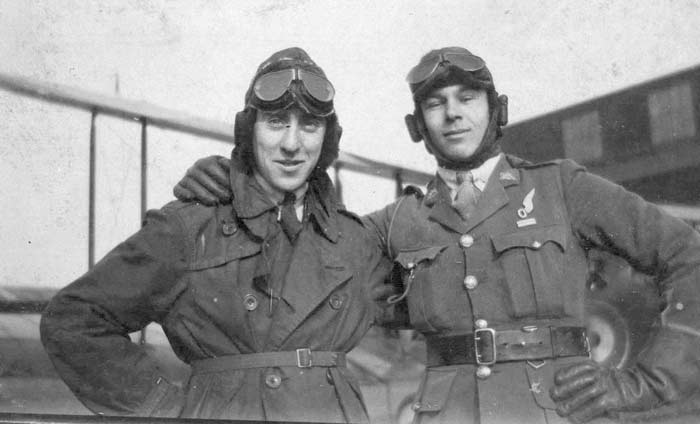
Trevor and J. Stephen
Blanford, D.F.C..pan>
This website also contains the story of another member of 206 Squadron, 2/Lt. Wilbur Arnold John, an observer lost in July 1918 and one of the aircrew whom,
after his recovery, Trevor Evans joined
206 Squadron to replace:
THE STORY OF WILBUR ARNOLD JOHN
These Great War pages are hosted by the Staffordshire Home Guard website - www.staffshomeguard.co.uk - a website devoted to the memory of Britain's WW2 Home Guards. To see the full contents of the website, please go to the
Contents and Index Page.
L5A
November 2023 © staffshomeguard
2009-2023


|
 Lt. E. Trevor Evans
was a young man from
Lt. E. Trevor Evans
was a young man from 



 This
and the following four images appear here with
grateful acknowledgement to the
This
and the following four images appear here with
grateful acknowledgement to the


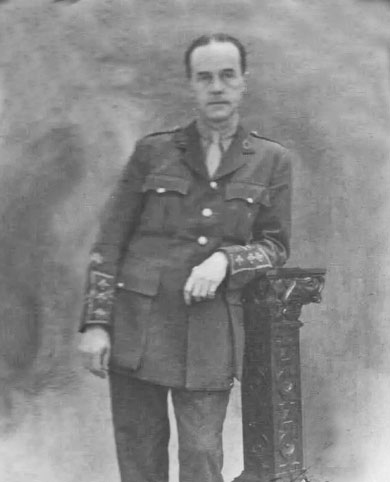
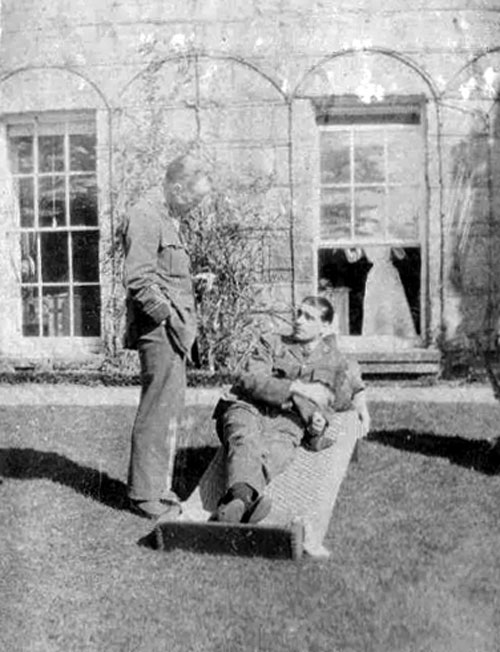








 As they
come out through the front door, they will turn right, crunching over the drive
of gravel or crushed stone, past the front of the house
and then the south wing pavilion which is set back to their right
beyond a strip of further lawn.
As they
come out through the front door, they will turn right, crunching over the drive
of gravel or crushed stone, past the front of the house
and then the south wing pavilion which is set back to their right
beyond a strip of further lawn. 















